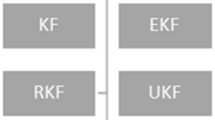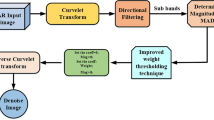Abstract
With regards to the problem of multidimensional signal processing in the field of adaptive filtering, geometric algebra based higher-order statistics algorithms were proposed. For instance, to express a multidimensional signal as a multi-vector, the adaptive filtering algorithms described in this work leverage all of the benefits of GA theory in multidimensional signal processing. GA space is employed to extend the traditional least-mean absolute third (LMAT) and newly deduced least-mean mixed third-fourth (LMMTF) adaptive filtering methods for multi-dimensional signal processing. The objective of the presented GA-based least-mean absolute third (GA-LMAT) and GA-based least-mean mixed third-fourth (GA-LMMTF) algorithms is to minimize the cost functions by using higher-order statistics of the error signal e(n) in GA space. The simulation’s results revealed that at significantly smaller step size, the given GA-LMAT algorithm is better than the others in terms of steady-state error and convergence rate. Besides, the defined GA-LMMTF algorithm mitigates for the instability of GA-LMAT as the step size increases and illustrates an improved performance relative to mean absolute error and convergence rate.









Similar content being viewed by others
Data availibility statement
The data analyzed in this study is available upon reasonable request.
References
Diniz, P.S.R.: Adaptive Filtering, Vol. 4. Springer, Berlin (1997)
Sayed, A.H., et al.: Distributed adaptive learning mechanisms. In: Handbook on Array Processing and Sensor Networks. Wiley, New York, pp. 695–722 (2009)
Cho, S.H., et al.: Least mean absolute third (LMAT) adaptive algorithm: mean and mean-squared convergence properties. In: Proceedings of Sixth Western Pacific Regional Acoustics Conference, Hong Kong, vol. 22. no. 10 (1997)
Eweda, E.: Dependence of the stability of the least mean fourth algorithm on target weights non-stationarity. IEEE Trans. Signal Process. 62(7), 1634–1643 (2014)
Lee, Y.H., et al.: Performance of least mean absolute third (LMAT) adaptive algorithm in various noise environments. Electron. Lett. 34(3), 241–242 (1998)
Zerguine, A.: Convergence and steady-state analysis of the normalized least mean fourth algorithm. Digital Signal Process. 17(1), 17–31 (2007)
Zhao, H., et al.: A new normalized LMAT algorithm and its performance analysis. Signal Process. 105, 399–409 (2014)
Guan, L.: Nonparametric variable step-size LMAT algorithm. Circuits Syst., Signal Process. 36, 1322–1339 (2017)
Pogula, R., Kumar, T.K., Albu, F.: Robust sparse normalized LMAT algorithms for adaptive system identification under impulsive noise environments. Circuits Syst. Signal Process. 38, 5103–5134 (2019)
Chambers, J.A., Tanrikulu, O., Constantinides, A.G.: Least mean mixed-norm adaptive filtering. Electron. Lett. 30(19), 1574–1575 (1994)
Lambotharan, S., Chambers, J.A., Tanrikulu, O.: Mixing and switching the norms of adaptive filter algorithms. DSP Limassol Cyprus 1, 130–135 (1995)
Rakesh, P., Kumar, T.K., Albu, F.: Modified least-mean mixed-norm algorithms for adaptive sparse system identification under impulsive noise environment. In: 2019 42nd International Conference on Telecommunications and Signal Processing (TSP). IEEE (2019)
Nasar, M.A., Zerguine, A.: The leaky least mean mixed norm algorithm. In: 2013 Asilomar Conference on Signals, Systems and Computers. IEEE (2013)
Shao, M., Nikias, C.L.: Signal processing with fractional lower order moments: stable processes and their applications. Proc. IEEE 81(7), 986–1010 (1993)
Walach, E., Widrow, B.: The least mean fourth (LMF) adaptive algorithm and its family. IEEE Trans. Inf. Theory 30(2), 275–283 (1984)
Wang, R., et al.: GA-ORB: a new efficient feature extraction algorithm for multispectral images based on geometric algebra. IEEE Access 7, 71235–71244 (2019)
Wang, R., et al.: L1-norm minimization for multi-dimensional signals based on geometric algebra. Adv. Appl. Clifford Algebras 29, 1–18 (2019)
Wang, R., Shen, M., Cao, W.: Multivector sparse representation for multispectral images using geometric algebra. IEEE Access 7, 12755–12767 (2019)
Cao, W., et al.: Multimodal medical image registration based on feature spheres in geometric algebra. IEEE Access 6, 21164–21172 (2018)
Shen, M., Wang, R., Cao, W.: Joint sparse representation model for multi-channel image based on reduced geometric algebra. IEEE Access 6, 24213–24223 (2018)
Lopes, W.B., Al-Nuaimi, A., Lopes, C.G.: Geometric-algebra LMS adaptive filter and its application to rotation estimation. IEEE Signal Process. Lett. 23(6), 858–862 (2016)
Al-Nuaimi, A. et al.: 6DOF point cloud alignment using geometric algebra-based adaptive filtering. In: 2016 IEEE Winter Conference on Applications of Computer Vision (WACV). IEEE (2016)
Wang, R., et al.: A novel least-mean kurtosis adaptive filtering algorithm based on geometric algebra. IEEE Access 7, 78298–78310 (2019)
He, Y., et al.: Novel adaptive filtering algorithms based on higher-order statistics and geometric algebra. IEEE Access 8, 73767–73779 (2020)
Arsenovic, A.: Applications of conformal geometric algebra to transmission line theory. IEEE Access 5, 19920–19941 (2017)
Franchini, S., et al.: ConformalALU: a conformal geometric algebra coprocessor for medical image processing. IEEE Trans. Comput. 64(4), 955–970 (2014)
Yan, J., Tong, M.: Weighted sparse coding residual minimization for visual tracking. In: 2011 Visual Communications and Image Processing (VCIP). IEEE (2011)
Wang, R., et al.: Geometric algebra in signal and image processing: a survey. IEEE Access 7, 156315–156325 (2019)
Wang, R., Shi, Y., Cao, W.: GA-SURF: a new speeded-up robust feature extraction algorithm for multispectral images based on geometric algebra. Pattern Recogn. Lett. 127, 11–17 (2019)
Hestenes, D.: New Foundations for Classical Mechanics. Vol.15. Springer (2012)
Crowe, M.J.: A History of Vector Analysis: The Evolution of the Idea of a Vectorial System. Courier Corporation (1994)
Vaz Jr, J., da Rocha, Jr, R.: An introduction to Clifford algebras and spinors. Oxford University Press (2016)
Grassmann, H.: LM Society, Ausdehnungslehre (History of Mathematics). American Mathematical Society, Providence (2000)
Lopes, W.B., Lopes, C.G.: Geometric-algebra adaptive filters. IEEE Trans. Signal Process. 67(14), 3649–3662 (2019)
Hestenes, D., Sobczyk, G.: Clifford Algebra to Geometric Calculus: A Unified Language for Mathematics and Physics, vol. 5. Springer (2012)
Diniz, P.S.R.: Nonlinear adaptive filtering. Adaptive Filtering: Algorithms and Practical Implementation. Springer, Boston, pp. 1–34 (2008)
Haykin, S., Widrow, B.: Least-Mean-Square Adaptive Filters (2003)
Hitzer, E.M.S.: Multivector differential calculus. Adv. Appl. Clifford Algebras 12, 135–182 (2002)
Strogatz, F., Mallinckrodt, McKay: Nonlinear dynamics and chaos: With applications to physics, biology, chemistry, and engineering. Comput. Phys. 8(5), 532 (2015)
Acknowledgements
This work was supported by the National Natural Science Foundation of China (NSFC) under Grant 61771299.
Author information
Authors and Affiliations
Contributions
All authors contributed to the study conception and design. Khurram shahzad and Yichen Feng analyzed the data, deduced new algorithm, performed experiments and wrote manuscript. Prof. Rui wang provided administrative support and supervised this project.
Corresponding authors
Ethics declarations
Competing interests
The authors declare no competing interests.
Additional information
Publisher's Note
Springer Nature remains neutral with regard to jurisdictional claims in published maps and institutional affiliations.
Rights and permissions
Springer Nature or its licensor (e.g. a society or other partner) holds exclusive rights to this article under a publishing agreement with the author(s) or other rightsholder(s); author self-archiving of the accepted manuscript version of this article is solely governed by the terms of such publishing agreement and applicable law.
About this article
Cite this article
Shahzad, K., Feng, Y. & Wang, R. Geometric algebra based least-mean absolute third and least-mean mixed third-fourth adaptive filtering algorithms. SIViP (2024). https://doi.org/10.1007/s11760-024-03230-0
Received:
Revised:
Accepted:
Published:
DOI: https://doi.org/10.1007/s11760-024-03230-0




